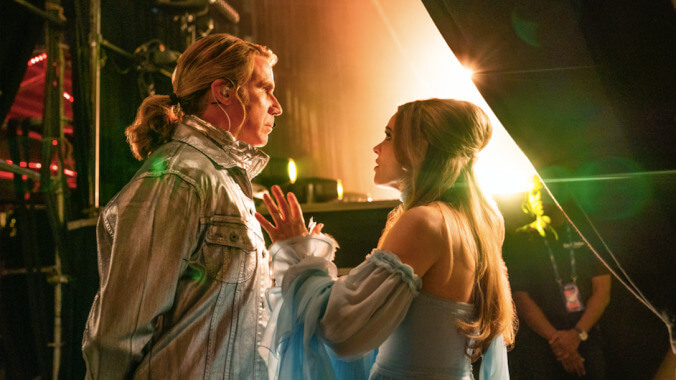Will Ferrell trades sports for pop songs in Netflix’s funny, loopy Eurovision

Although he was in his 30s when he began his leading-man career in earnest, Will Ferrell’s big-screen output (as well as plenty of his small-screen SNL work) has largely been defined by midlife crisis. He tends to play characters who are comically inept at accepting their limitations, leading to a thirty- or fortysomething man who acts like a child (Elf), an angry tween (Step Brothers), a college student (Old School), or a general cock of the walk (Ron Burgundy, et al.). So it’s been a strange spectacle, these last five years or so, watching the career of such a self-aware actor go through its own form of middle-aged aimlessness. Since parting ways with long-term collaborator Adam McKay, Ferrell’s big-studio vehicles have increasingly felt like joyless imitations of his past work—ersatz reenactments of his comedic glory days. They have the “right” co-stars and premises, but the lunatic inspiration and satire has gone missing.
In a lot of ways, Eurovision Song Contest: The Story Of Fire Saga resembles Ferrell retreating into a greatest-hits mode, in sync with a movie about cheesy pop music. As in Step Brothers, he plays a young-at-heart, older-in-body goofball who lives with a single parent and harbors dreams of becoming a singer. He sports long hair and a ridiculous costume, just like he does in Blades Of Glory, and the narrative is driven by a contest—a singing competition, now that he’s run out of athletic ones. Eurovision even boasts an unwieldy subtitle in the style of The Ballad Of Ricky Bobby or The Legend Of Ron Burgundy.
But like a scrappy underdog with no rational shot at winning an international singing contest, this Netflix production proves surprisingly lively. It follows the passion of Lars Erickssong (Ferrell), who was jolted out of childhood grief by witnessing the triumph of ABBA’s “Waterloo” at the Eurovision music contest of 1974. Since then, he has single-mindedly pursued his goal of winning that same contest, much to the disappointment of his taciturn father (Pierce Brosnan). This determination has resulted in a long-standing side hustle co-fronting a band called Saga Of Fire with his childhood friend, Sigrit (Rachel McAdams), who of course has an undying affection for Lars.
Yes, Eurovision is another comedy where a man-child inexplicably attracts the loyalty of a beautiful woman. But McAdams commits to Sigrit’s humanity and cartoon loopiness simultaneously, and gracefully. As with Game Night, she delivers a detailed and believable comic performance under absurd circumstances, all while re-centering what could have been a simplistic love-interest part. Lars is ridiculous, and she’s right there alongside him, believing in their dream (and also elves). The screenplay by Ferrell and Andrew Steele offers some nuance, too: Lars, who compulsively notes that Sigrit is “probably not” his sister (his father’s small-town philandering casts some doubt), isn’t fully oblivious to her love, or to his own feelings for his longtime creative partner. He’s just convinced that they need to put the music first.
Through a series of unlikely circumstances best not revealed, Saga Of Fire does eventually wind up representing Iceland at Eurovision, at which point it becomes clear that the movie isn’t really out to satirize the melodramatic excesses of competitive pop. Ferrell and Steele seem to have bonded over a mutual love of genre parody that skirts uncomfortably close to the real thing; they’ve worked together on soap opera goofs like Casa De Mi Padre, The Spoils Of Babylon, and Lifetime-movie tribute A Deadly Adoption. Accordingly, the songs in their version of Eurovision strive for accuracy. These aren’t Lonely Island-style numbers where the impeccably imitated songcraft delivers actual jokes, though the production numbers from Alexander Lemtov (Dan Stevens), with their sexualized Lion King energy, come closest. Most of the time, the cheese appreciation appears genuine. When Lars and Sigrit participate in a house party mash-up sing-along where real-life winners from Eurovisions past perform straight to the camera with the unnerving conviction that audiences will recognize them, director David Dobkin isn’t staging the spectacle for yuks. At the same time, he might get some anyway—not through mockery or jokes but the sheer demented energy of the whole shebang.
The film’s earnest fascination with Eurovision results in less dead air between its biggest laughs, even as a predictable story somehow manages to hit the two-hour mark. A fair percentage of the movie’s gags are runners, but most of the time, they hit; Eurovision falls well short of a laugh a minute, but it has some uproarious moments that something like Holmes & Watson lacked. If the movie tee-hees a bit about “funny” European accents, it also takes some time to run down Americans with specific and spirited dismissiveness. That’s always been a part of Ferrell’s work—his understanding of American mediocrity, and his delight in poking at its oblivious limitations. Eurovision both softens and expands his worldview, allowing him to indulge some small-town-dreamer pathos without getting into hokey Americana. If he’s playing the hits, he’s starting to interpret them with style.